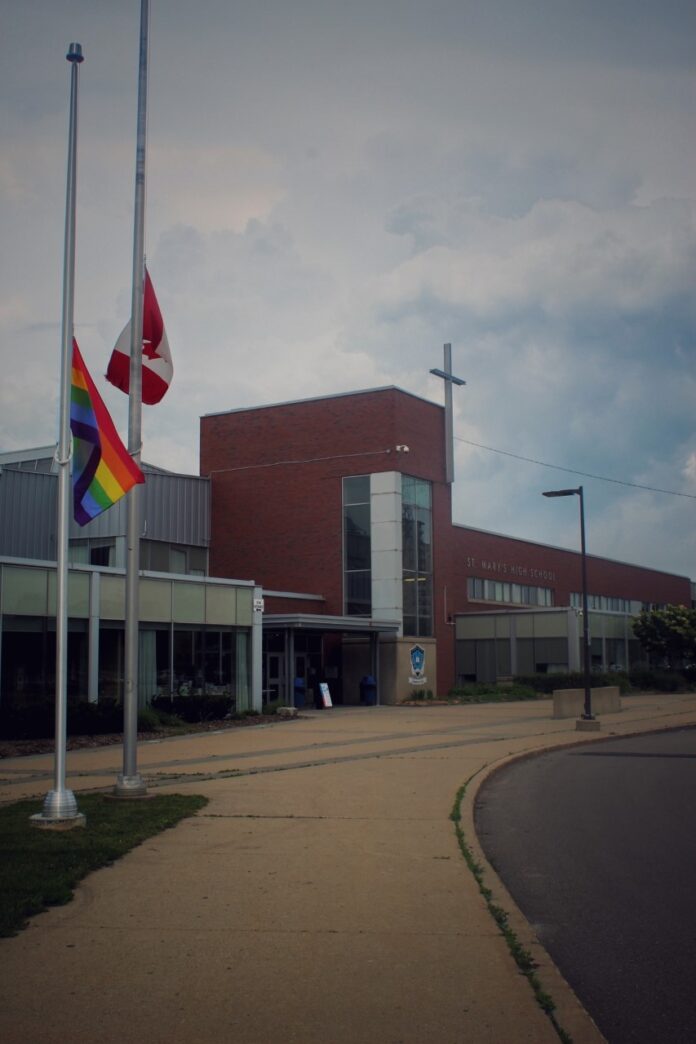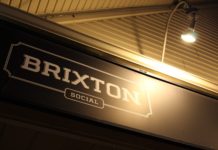June 2021 marks the first time that the Waterloo Catholic District School Board (WCDSB) has decided to fly the Pride flag at its regional schools in support of the LGBTQ+ community.
Members of the Pride and Respect for Individuals of a Sexual Minority (PRISM) club at St. Mary’s High School in Kitchener, Ont. called the decision “a step in the right direction.”
“The Pride flag, by itself, will not fix the strained relationship between the LGBTQ+ community and the Catholic church, and by extension, Catholic school boards,” said Christine Bendia, a PRISM staff leader.
PRISM is a support group and a safe place for LGBTQ+ students to be with people they can trust, according to Grade 12 student Dante Duval.
“Not all students have friends or family that they can talk to about anything that they’re struggling with in terms of being a queer person,” Duval said. “[PRISM’s] a place where they can discuss how they’re feeling if they’re going through a tough time.”
PRISM staff leader Jessica Elias said the program is a space where students and staff can talk about how to promote diversity and inclusivity in schools, which is further supported by raising the Pride flag.
“Raising just [the Pride flag] emphasizes that everyone is safe here, everyone’s welcome here and everyone’s included,” Elias said.
Duval pointed out that even though the flag might not seem like much, it represents inclusivity and safety for many individuals. “I hope that when [people] see that flag they can be like, ‘You know what? There is someone there on my side. There is someone that I can count on. There are people there that are going to be there for me if I need them’.”
In an interview with CTV News Kitchener, board trustee Greg Reitzel said he disapproved of the decision. “I believe this attempt is misguided. No truth for past hurts will be found in a piece of fabric,” Reitzel said.
He added that he understands that this is a genuine want for healing from a marginalized community. However, such comments by Reitzel have been met with backlash.
“The fact that we are getting resistance from upper levels of the Board of Trustees is a sign that this is still a contentious issue within the community,” said PRISM staff leader, Todd Horne.
Horne also mentioned that the flag is a good first step, but there is still considerable work to be done before the LGBTQ+ community feels accepted and welcomed.
“Symbols are good. Backing them up with policy and action is what makes these symbols real and true.”
Duval also spoke about how a lack of familiarity and knowledge can be a factor in an individual’s disagreement with the board’s decision. He emphasized that despite this, open-mindedness is necessary.
“To an extent I can understand if it’s not something you’re familiar with, but you need to be able to have that open-mindedness to realize that this is the future that we’re going into,” Duval said.
Members of PRISM also mentioned that education, advocacy and representation are pivotal in continuing to promote equity and inclusion at schools.
“I think what it comes down to is educating,” Elias said. “If you are educated in the topics and you explore and you identify and you meet people you know from different groups, then you can understand and come to that realization that you know we’re all people. We all should be included. We all should be accepted. We all should be valued and have our voice in society.”
Duval mentioned that education about queer people such as gender identity and sexuality being implemented in the curriculum would also be helpful.
“I think those are really important things that if you’re not a queer person, it’s not something you’re going to go out and research or try to better understand, because it doesn’t apply to you,” Duval said.
Bendia also spoke about the importance of representation. “From my own experience, being possibly the first and only out transgender staff member in our board, I would love to see more representation,” Bendia said.
“I worry about the impact on those students, and on myself, that comes with never seeing anyone else that has the same unique experiences and struggles we do. It can be incredibly alienating and lonely,” Bendia added.
Horne emphasized that adults should be listening to students and that students need to feel safe when voicing concerns and ideas. He also said systemic change is required. “It’s great that the board comes on top and says we’re going to do a Pride flag,” Horne said. “But I would love to hear them say to the kids, ‘What’s the biggest thing we can do to support you’?”































